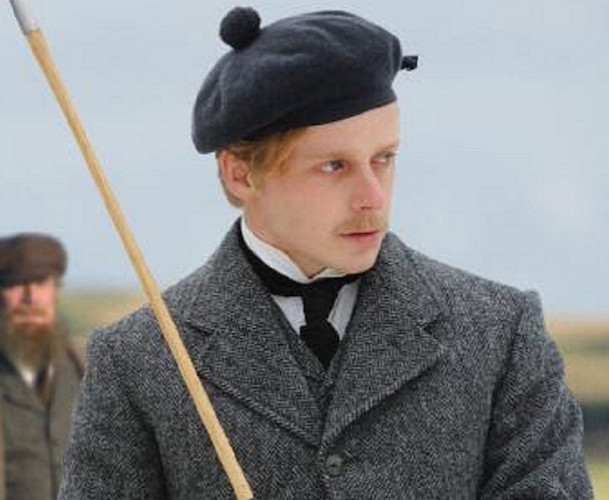Film Review: “Tommy’s Honour” — A Golden Boy of Golf
Not being a golf enthusiast, I must admit that seeing the minimalism of the sport in its infancy was very appealing.
Tommy’s Honour directed by Jason Connery. Screening at Tremont Theatre, Boston, West Newton Cinema, and AMC Loews Liberty Tree Mall, Danvers, MA.

Jack Lowden as Tommy Morris in “Tommy’s Honour.”
By Peg Aloi
Golf is on the minds of concerned Americans slightly more than usual these days, given that executive decisions are perhaps being made amid bunkers in luxurious settings far, far from Washington DC. But posh as Florida’s greens may be, they cannot hold a candle to the dramatic golf courses of Scotland, where the game was born. This new film about golf’s early days, focusing on two of its most iconic founders, tries to be a biopic that celebrates sports figures, but succeeds more in being a moody period piece helped along by grand scenery.
Before he began directing, Jason Connery was an actor, still best known for his debut as the tow-headed Robin Hood in Showtime’s Robin of Sherwood. Connery’s earlier efforts have tended to be genre films: horror, thriller, sci-fi. This latest story is about a native son (based on a book by Kevin Cook) and marks a narrative departure for Connery, himself the son of a famous Scotsman, actor Sean Connery (and Diane Cilento, best known for 1973’s The Wicker Man). Tommy’s Honour is the story of two Toms: golfing legend Tom Morris, Jr, and his father Thomas Morris, who is credited with being the founder, if not the inventor, of golf. Morris designed dozens of golf courses in Scotland, which is still considered the premiere setting for the sport by pros and amateurs alike. The mingling of professionals and amateurs is also very much at the heart of this story, because in the late Victorian era golf was very much a gentleman’s game. Lower class types were only permitted to be caddies or greens keepers. The Morris men changed all that, and this film follows Tommy Jr.’s meteoric rise and tragic fate.
The film begins at the turn of the century, with a journalist speaking to Morris, Sr. (played by Peter Mullan), an elderly man who seems to live a solitary life in a grand stone castle. Tom’s being interviewed about his life but also about his son, who we learn died many years earlier. Morris worked as a caddy in his younger days and then, as a greenskeeper, became a valued asset to the golfing gentleman of St. Andrews, making balls and fixing and designing clubs. Young Tom grows up learning this trade as well, but at a very young age shows a knack for the game. A yearly Open Championship is the only opportunity where men of the lower classes may play on this opulent course among their higher-born counterparts. Seventeen year old Tommy becomes a local hero when he wins its top honor three years running (he still holds this record). Tommy (played by Jack Lowden, a handsome, impish young actor who looks like a cross between Simon Pegg and Matthew Broderick) has dreams of being a professional golfer, but Tom Sr. says he cannot aspire beyond his class. The gentleman who run the club (Sam Neill among them) clash with Tommy’s bold arrogance, but can’t deny he is the region’s best golfer.
Still, it’s the late Victorian era, and attitudes about class restrictions are softening up. Tommy can sense this, even if his father cannot, and this tension complicates the family’s dynamic. Tommy’s younger brothers dote on his success, and his friends enjoy the cache of his popularity. When Tommy falls in love with Meg, a barmaid (played by Ophelia Lovibond) several years older than he, there is further contention because the Tommy’s mother disapproves of the girl’s troubled past. Meg resists becoming infatuated at first, but Tommy’s charms, and rapt devotion to her, finally wear her down: the two seem perfectly suited as a couple. After they marry, Tommy’s mother, a devout religious woman, slowly comes around, and on the night of Hogmanay, an important winter holiday in Scotland, the two families finally come together. Tommy’s trajectory as a golfer seems to be unstoppable, and his father finally concedes Tommy might have a shot at making golf an international craze, as news of his young prowess spreads around the world. Alas, more tragedy is in store, and a harsh Scottish winter plays its devilish part.
Not being a golf enthusiast, I must admit that seeing the minimalism of the sport in its infancy was very appealing. Set amid vast expanses of the magnificent Scottish countryside, it is played without contemporary accoutrements (no carts, no plastic tees, no pastel shirts, no technology-enhanced coverage). In a sense, Tommy’s Honour does not feel like a conventional “sports movie” in any way. It comes off as an enjoyable period piece about a family who happen to have founded what became a multi-billion dollar pastime. Lowden’s form as a golfer is particularly thrilling to watch. It should be noted that, though are performers are very fine and seem perfectly comfortable in late Victorian Scotland, their Scottish accents are heavy, perhaps best enjoyed by audiences who have a practiced ear for British cinema. Still, Tommy’s Honour is well worth recommending, particularly to those who enjoy films set in Scotland, Victorian era romances marred by tragedy (aren’t most of them?) and stories of athletic golden boys who bask, briefly and gloriously, in the light of love and pride.
Peg Aloi is a former film critic for The Boston Phoenix. She has taught film studies for a number of years at Emerson College and is currently teaching media studies at SUNY New Paltz. Her reviews have appeared in Art New England and Cinefantastique Online.
